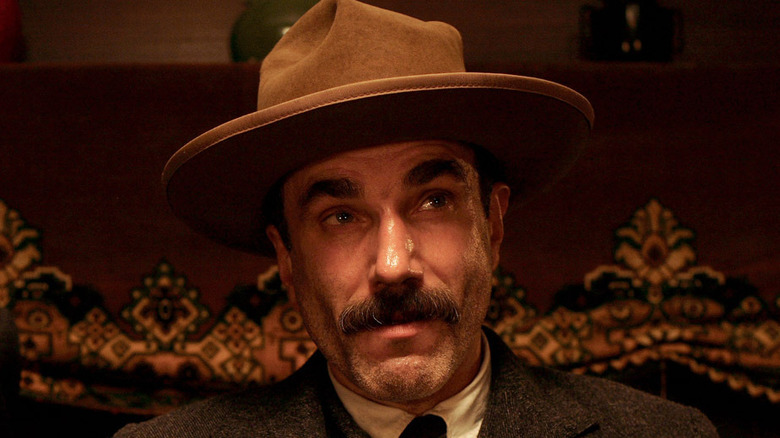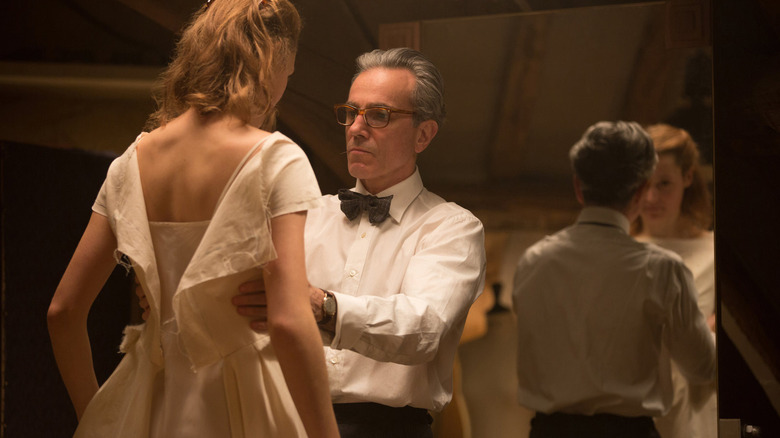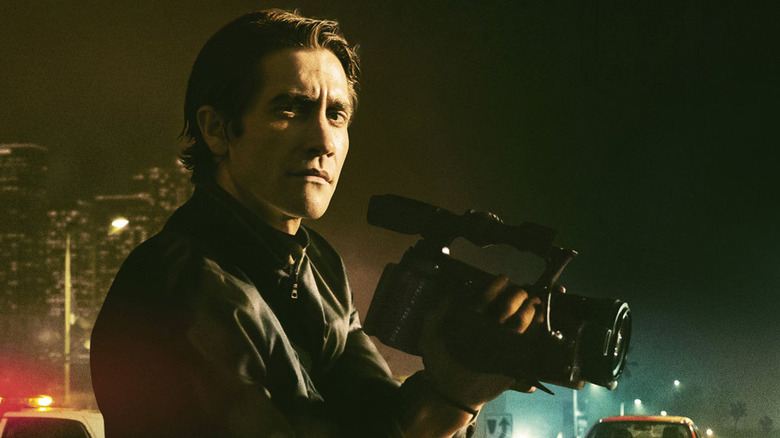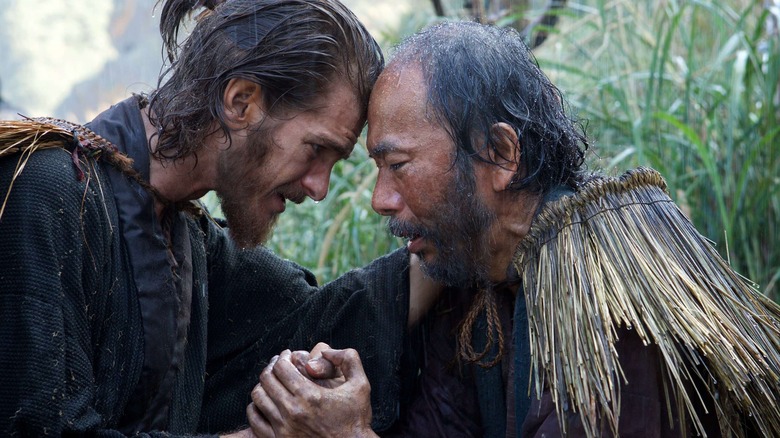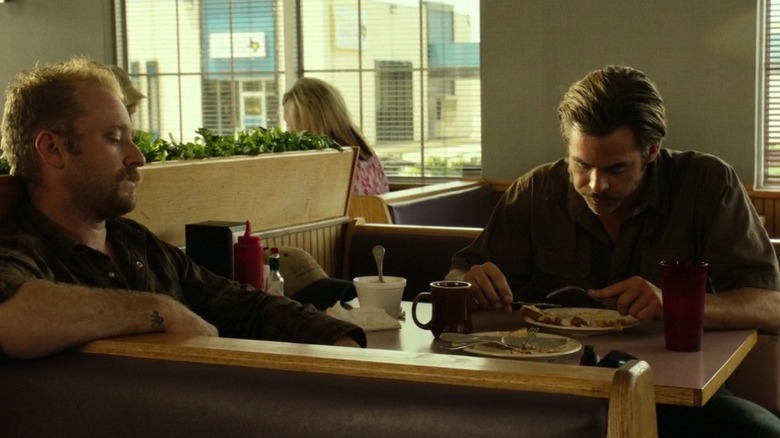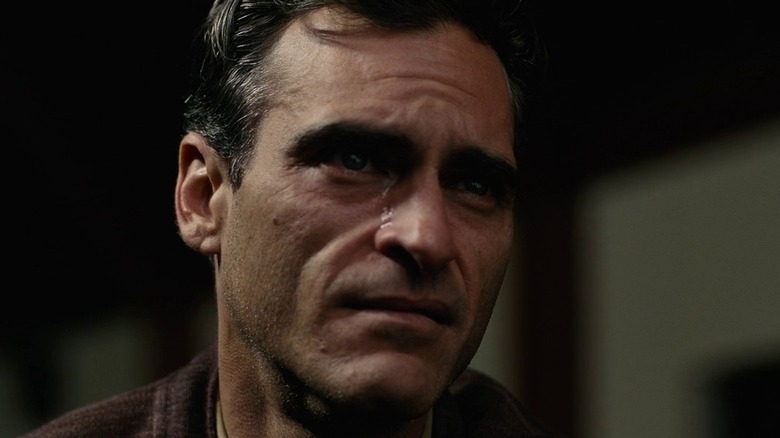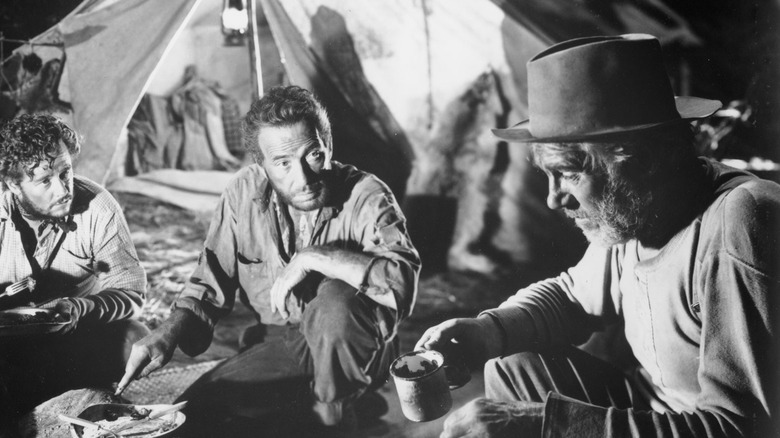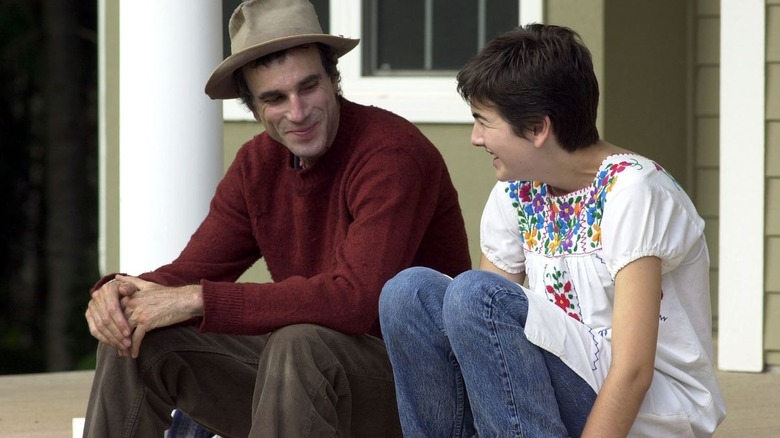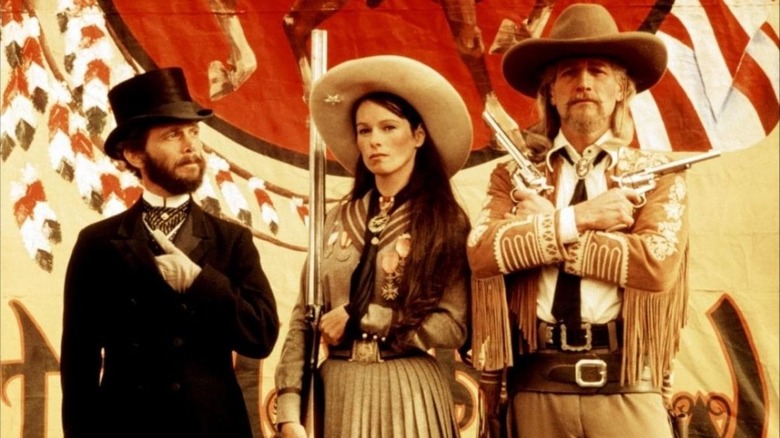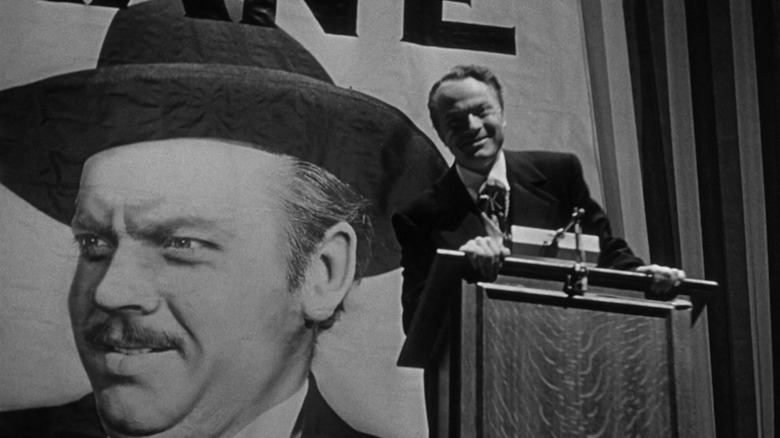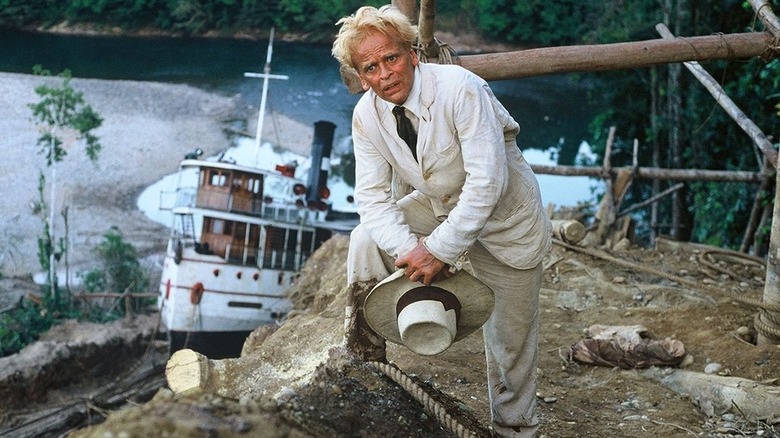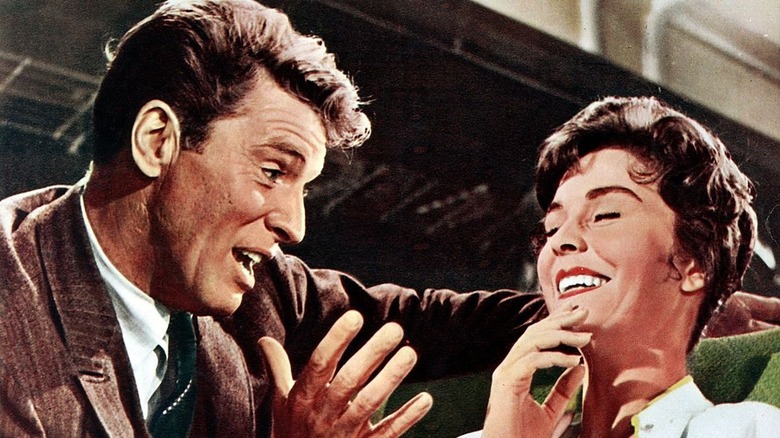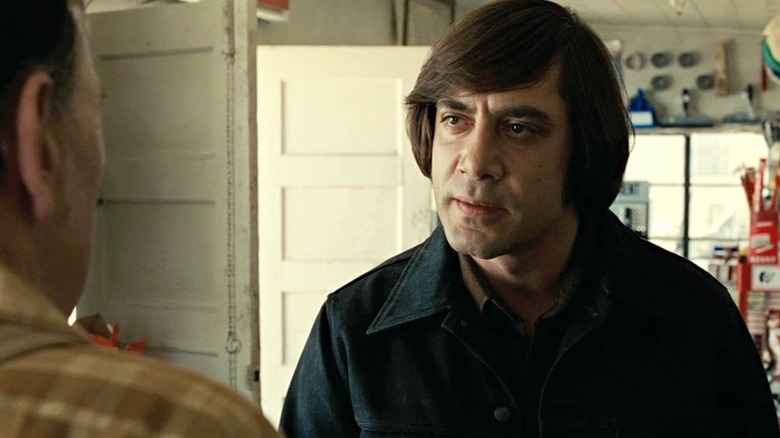12 Movies Like There Will Be Blood That Drama Fans Need To See
Paul Thomas Anderson's 2007 masterpiece "There Will Be Blood" is a singular experience. Though mixed with the influences of countless classic films, it's also so distinct that it can't even be pigeonholed. It's even a standout among the rest of Anderson's filmography, as it doesn't conform to his typical recurring motifs. That idiosyncratic quality is what makes this such a phenomenal movie to behold, but it can also make it difficult to figure out where to go in your film-watching exploits once you're done. What's next? What other movies could serve as a suitable follow-up to such an extraordinary accomplishment of cinematic storytelling?
Though nothing can quite match the oddness and bleakness of "There Will Be Blood," the history of film as a medium is rife with films that are must-watches for those enamored with this particular Paul Thomas Anderson title. These range from films that cover similar thematic territory to "Blood" to features that were directly responsible for informing the creation of this Best Picture nominee. However they connect to "There Will Be Blood," these movies serve as fitting follow-up viewing.
Phantom Thread
The obvious next place to go if you're looking for more movies in the vein of "There Will Be Blood" is "Phantom Thread," the other movie that united director Paul Thomas Anderson and Daniel Day-Lewis. Much like "Blood," "Thread" is an immaculately detailed production headlined by a character unlike any you've ever seen. Both projects are also accompanied by a Jonny Greenwood score that accentuates the intense mood and atmosphere. Both movies oscillate between grim drama and dark comedy. Most importantly, both films showcase the on-screen magic that Anderson and Day-Lewis make together. "Anderson, with his increased favoring of tight close-ups, is ideally suited to capturing the emotions competing for control of Day-Lewis' features," A.A. Dowd of The A.V. Club wrote about "Phantom Thread," before noting that the duo "is a director-star pairing for the books."
"Phantom Thread" is no retread of "There Will be Blood"; rather than following the rough, backcountry exploits of a self-made oil man during the American Gilded Age, it tells the story of a warped romance in the high-end fashion world of 1950s London. If "Blood" was your first experience of this auteur, then "Phantom Thread" will be the perfect film to reflect his flexibility as an artist.
Nightcrawler
What is success in America? Daniel Plainview and his excessive number of oil fields embody a traditional view of success in this country. Extracting all that wealth from the land without any regard for the people who get hurt along the way, including Plainview's own son, is one way to follow the "American dream" to its most extreme conclusion. The question "There Will Be Blood" leaves the audience with is whether or not this definition of "success" is actually something we should strive for.
A similar haunting contemplation of American capitalism's vision of success could be seen in the 2014 Dan Gilroy effort "Nightcrawler." Much like "There Will Be Blood," "Nightcrawler" is anchored by a phenomenal and haunting lead performance, in this case delivered by Jake Gyllenhaal. Playing the character of Lou Bloom, Gyllenhaal speaks with the mechanically chipper words and vocals of an online training seminar as he promises other vague notions of "fulfillment" in working with or for him. Said work entails videotaping the aftermaths of violent crimes for local news stations. Bloom rises to the top on the back of other people's suffering, achieving "success" without blinking an eye at the bodies he's stepped over along the way. Both films are also set in supposedly sunny Southern California, so it's fun to watch them as portraits of a particular location over time.
Silence
The modern film landscape doesn't offer many opportunities for American epics that aren't PG-13 action movies. If it doesn't have a superhero or a fantasy creature in it, chances are you can't make the kind of lavish, high-quality production that was common in older eras of Hollywood. If "There Will Be Blood," inspired a hankering for more modern-day epics, look no further than Martin Scorsese's "Silence."
Budgeted at around $50 million—far from the largest budget ever, but still considerable for a movie that doesn't exactly have "blockbuster" written all over it—"Silence" uses every penny of its price tag to tell the tale of two missionaries searching for a mentor figure in feudal Japan. It's a rescue mission that leads them to physical challenges as well as ones rooted in the spirit, such as the protagonist's (Andrew Garfield) struggles with viewing himself as a Christ-like figure.
Like "There Will be Blood," "Silence" is a challenging but brilliant project. Richard Combs of Sight & Sound wrote of it, "Scorsese's most expansive historical canvas, but in the tightness with which it plots these torturing relationships that might lead to enlightenment it is his most hermetic, secretively enclosed." Like "There Will Be Blood," "Silence" does not sacrifice depth for scale. Both productions exemplify the weighty themes auteurs can explore when lent big-budget canvases in the modern landscape of cinema.
Hell or High Water
In "There Will be Blood," Southern California is the backdrop for a story about the horrors wrought by evil men with too much money and power, but the film was largely made in Marfa, Texas. If that particular yarn leaves one hankering for a story about Texas from the opposite side of the financial tracks, "Hell or High Water" will satisfy your craving like a sip of water after a long trek through Amarillo, Texas. The story of two brothers (Chris Pine and the ever-excellent Ben Foster) who rob banks to get back money unjustly stolen from their late mother, "Hell or High Water" shines a light on the human beings left crushed by the 2008 financial crisis.
The horrors of financial inequality that are just a small part of "There Will Be Blood" are the crux of "Hell or High Water," as the lead characters and the viewer navigate a world so deprived of financial opportunities that breaking the law is the only way to find justice. David MacKenzie's 2016 neo-Western never fails to challenge the moral sensibilities of the viewer. The aching, haunting tone only makes it more riveting. There are no heroes here, just people trying to figure out a way to survive the warped financial world of the 21st century. "Hell or High Water" isn't just a great film on its terms; it's also the result of what happens when the power of people like "There Will be Blood's" Daniel Plainview go unchecked for decades.
The Master
For five years after "There Will Be Blood," writer/director Paul Thomas Anderson went silent. The famous filmmaker took his time in delivering his next movie, "The Master." It told the story of World War II veteran Freddie Quell (Joaquin Phoenix), who finds kinship in a religious cult leader (Phillip Seymour Hoffman). "The Master," much like "There Will Be Blood," looked at complicated human beings in an early 20th-century setting who failed to fit into what society called "normal," though Quell at least has empathy (unlike the sociopathic Daniel Plainview).
Paul Thomas Anderson's fascination with examining the finer nuances of troubled people from this era of American history made "The Master" just as beloved as "There Will Be Blood" critically. "Mysterious as the pathologies it resists explaining, grand as the big questions it refuses to answer, 'The Master' feels like the perfect marker for this half-elapsed decade," wrote The A.V. Club when the website selected "The Master" as the best film of the 2010s so far in 2015. If one is searching for another film with the craft and skill of "There Will Be Blood," Paul Thomas Anderson's follow-up to that 2007 masterpiece will do perfectly.
The Treasure of the Sierra Madre
While making "There Will Be Blood," Paul Thomas Anderson drew deep inspiration from the 1948 John Huston film "The Treasure of the Sierra Madre." "I was trying to find something that was 100 percent straightforward, old-fashioned storytelling," Anderson said about the film at a 2007 Director's Guild of America screening of "Sierra Madre." "I definitely tried to mimic that approach. My natural instincts as a writer may be more scattered, so in an effort to be more traditional I used a book, just like they did. Sierra Madre is as direct as you can get—nothing clever, nothing structurally new or different—and I mean that as a high compliment. It's harder than anything else to be completely straightforward."
It's easy to see the parallels between "Blood" and "Sierra Madre," particularly in how both chronicle men who will sacrifice anything for riches and end up losing themselves in the process. "Blood" takes that to a much more gruesome end than "Sierra Madre," a movie made during the Hays Code era of American filmmaking, ever could. Still, both provide fascinating insights into what humans will do when confronted with the temptation of greed. Exploring that theme makes "The Treasure of the Sierra Madre" both a masterpiece and a perfect companion piece to "There will be Blood."
The Ballad of Jack and Rose
The two standout performances of "There Will Be Blood" are Daniel Day-Lewis and Paul Dano, with the two not only getting large amounts of screentime but also numerous opportunities to engage in a conflict. Their work together in this 2007 Paul Thomas Anderson feature is so watchable that it's a shame the pair hasn't worked together again since. Those craving more cinema starring Day-Lewis and Dano need to check out a film released before "There Will Be Blood," "The Ballad of Jack and Rose."
A 2005 feature from writer/director Rebecca Miller, "The Ballad of Jack and Rose" scored mixed reviews upon its initial release, but those who appreciated the film developed an intense attachment to the feature. Among those who praised it were Roger Ebert, who called it "an absorbing experience" and went on to praise, among other qualities, how well Miller eschewed cliché storytelling paths in her writing. Even across negative reviews, Day-Lewis and Dano received praise for their individual performances. While it won't be for everyone, fans of "There Will Be Blood" owe it to themselves to check out the first time the film's two lead actors worked together.
Buffalo Bill and the Indians, or Sitting Bull's History Lesson
"There Will Be Blood" is dedicated to filmmaking legend Robert Altman. The man behind influential works like "McCabe and Mrs. Miller" and "Nashville," Altman's career, much like Paul Thomas Anderson's, spanned multiple genres and wasn't shy about embracing dense ensemble casts. Altman's 1976 Western "Buffalo Bill and the Indians, or Sitting Bull's History Lesson" is a direct predecessor to "There Will Be Blood."
Much like "There Will Be Blood," "Buffalo Bill and the Indians, or Sitting Bull's History Lesson" is a Western that complicates the audience's idea of heroic figures (in this case, folks like General Custer). Though initially divisive, Altman's "Buffalo Bill" has endured to garner praise today. "Altman skewers the American historical myth of heroism, in this case the notion that noble white men fighting bloodthirsty savages won the West. He uses the setting to criticize Old West motifs, dissecting the Western hero as a showbiz creation who can no longer distinguish between his fabricated image and factual reality," wrote Emanuel Levy on the feature.
With this kind of praise at its back, "Buffalo Bill and the Indians, or Sitting Bull's History Lesson" is a prime title to view for those curious about a filmmaker that influenced "There Will Be Blood."
Citizen Kane
"There Will be Blood" is a powerful film about the inherent emptiness of centering one's life around accumulating wealth. But it isn't the first film to contemplate the emotional vacuity in the existences of wealthy individuals. The grandaddy of such titles is the 1941 film "Citizen Kane," which revolutionized how we make movies. To this day, the filmmaking techniques pioneered by "Citizen Kane" are still being employed. Its legacy is simply enormous.
Like "There Will be Blood," "Kane" also follows a fellow, in this case Charles Foster Kane, as he pursues glory only to end up with a life as hollow as the empty mansion he dies in. Both films span decades, plumbing the depths of their respective protagonists' tragic plights. The similarities between the two titles even seeped into initial critical reviews of "There Will Be Blood," with Peter Bradshaw of The Guardian observing how a moment involving Plainview and a map in "There Will Be Blood" evoked a musical number from the earlier film about "good old Charlie Kane."
Both movies offer different experiences in terms of tone and filmmaking, with Bradshaw noting that Plainview and Kane have distinct personalities (Plainview is a rough-edged misanthrope; Kane is a loquacious, charming playboy). However, both "There Will be Blood" and "Citizen Kane" offer cautionary tales over how wealth and power simply can't cure everything.
Fitzcarraldo
Put simply, "Fitzcarraldo" is the movie with the big boat. Loosely based on real events, director Werner Herzog's 1982 movie chronicles the exploits of Brian Sweeney Fitzgerald, who embarks on a quest to build an opera house in the middle of a deep jungle. To do this will require pushing a large steamship over an even more massive mountain. It's a film about a man who embarks on the most audacious of capitalist quests with little regard for the human costs of such an endeavor. Whether it's the South American wilderness or the arid, inhospitable California landscape, the heroes of both "Fitzcarraldo" and "Blood" seek to control nature and use it for their own ends.
It doesn't take much contemplation to see the similarities between "Fitzcarraldo" and "There Will be Blood" on a thematic level. Though it has since garnered criticism for the treatment of its crew, "Fitzcarraldo" has also scored widespread acclaim for its sheer audacity and originality. "Fitzcarraldo' is not a perfect movie, and it never comes together into a unified statement," Roger Ebert wrote. "The movie does not approach perfection as 'Aguirre, the Wrath of God' did. But as a document of a quest and a dream, and as the record of man's audacity and foolish, visionary heroism, there has never been another movie like it."
Elmer Gantry
During "There Will Be Blood," Paul Dano's Eli Sunday delivers a sermon that features a line of dialogue that may be familiar to fans of Burt Lancaster movies: "I'll bite him, and if I have no teeth I'll gum him." That distinctive piece of writing hails from the 1960 Best Picture nominee "Elmer Gantry." A feature from director Richard Brooks, the production concerns a salesman (Burt Lancaster) positioning himself as the perfect preacher accompanist to a roadside revivalist played by Jean Simmons. Their newfound dynamic onstage gets complicated when a figure from the salesman's past creeps back into the picture for revenge.
The film's message—that even men of faith are flawed human beings like everyone else—is congruent with "There Will Be Blood," particularly regarding its final scene depicting Eli Sunday at his lowest and most vulnerable point. Given these overlapping thematic qualities, it's easy to see why Paul Thomas Anderson would incorporate a nod to "Elmer Gantry" within this 2007 feature. Another quality "Elmer Gantry" shares with "There Will Be Blood" is widespread critical acclaim. "The briskly paced drama of a religious opportunist, his colleagues and his times utilizes the tools of the motion picture in expert fashion," wrote A.H. Weiler for The New York Times on "Elmer Gantry." Praise like that should make "Elmer Gantry" extra enticing to fans of "There Will Be Blood."
No Country for Old Men
For the 80th Academy Awards, the Best Picture award came down to two movies: "There Will Be Blood" and the eventual victor, the Coen Brother's "No Country for Old Men." In several ways, the films are very different, including the time periods in which the stories are set and the filmmaking techniques of their individual directors. But both movies offer bleak tones, start settings, memorably odd characters, and moments of dark, offbeat laughter. Neither provides much hope for the future or the fate of men.
Even separated from how it compares to "There Will be Blood," "No Country for Old Men" is still a masterful experience of a movie. One of the darkest but also most accomplished works to come from directors Joel and Ethan Coen, "No Country for Old Men" is guaranteed to keep you on the edge of your seat. Bravura performances from the likes of Javier Bardem (and his hair) don't hurt, either. More than a decade after its initial theatrical release, it's easy to see why "No Country for Old Men" took home the Best Picture Oscar as well as how it provides fascinating parallels to "There Will Be Blood."
